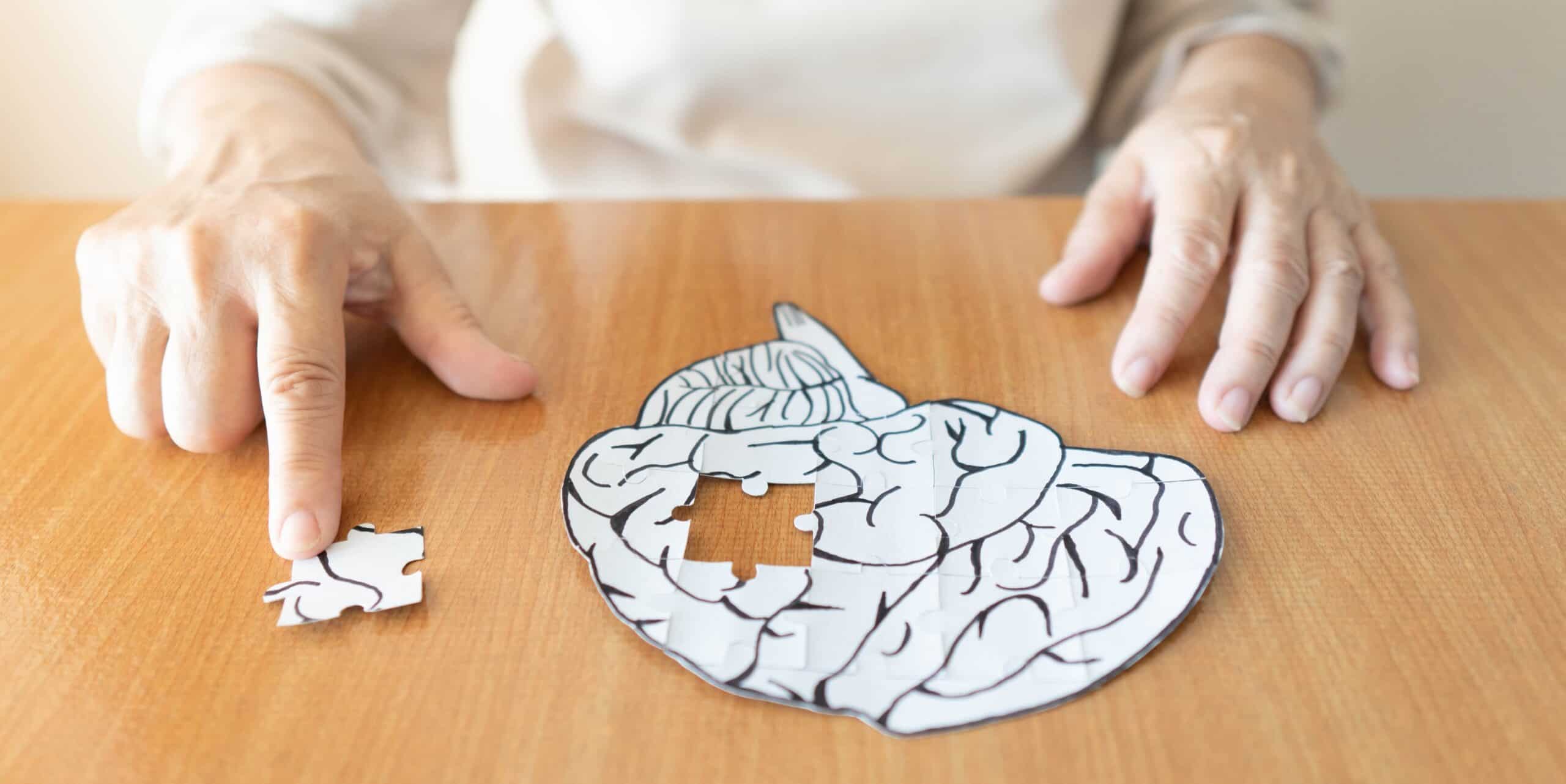Cannabis and Dementia Does Cannabis Help With Agitation of Alzheimers Disease

According to a study, over 90% of patients with Alzheimer’s disease experience adverse behavioral symptoms, while 30 to 50% of them go through agitation, which is distressing not only to the patients but to those looking after them. Agitation, a common symptom of most forms of dementia, is characterized by elevated and uncontrolled restlessness, emotional tension, increased motor activity, and sudden aggressiveness. Understanding various aspects of how agitation is caused in Alzheimer’s disease, you shall be well-acquainted with everything you need to know to deal with your Alzheimer’s patient.
Studies analyzing the interactions between cannabis and dementia bring forth a series of mind-blowing results. The healing potentials of cannabis extracts induce a range of alterations in the working of the endocannabinoid system and the body’s nervous system. The following write-up briefly discusses the links between cannabis and dementia.
Signs and Symptoms Of Alzheimer’s Disease:
The disease is generally characterized by declined production and interaction of neurotransmitters like acetylcholine in the brain due to deposits of amyloid and tau protein in the brain. These deposits form plaques and lead to physiological degeneration of the brain. Patients may resultantly experience the following symptoms:
- Poor memory
- Finding it hard to decide
- Lack of sense of starting things and taking initiative
- Getting lost while strolling around
- Anxiety
- Agitation
- Depression
- Repeatedly asking the same questions
- Abrupt changes in personality and behaviors.
Types of Alzheimer’s Disease:
Generally, all types of Alzheimer’s disease are characterized by the same symptoms; thus, we hardly get to hear about the types. All these types share the same cause- excessive production of amyloid plaques in the brain. However, experts still find a distinction in the types based on the people they affect. Stick around to learn more:
- Early Onset Alzheimer’s
A rare type of Alzheimer’s disease, early-onset Alzheimer’s typically affects people lying below their 60s. Well, studies unleash that such cases are no more than 5% of all the Alzheimer’s patients in the world.
People get vulnerable to developing Alzheimer’s disease around their 40s and 50s because of hereditary and other medical factors. People with certain medical conditions like Down’s syndrome are greatly exposed to developing the said condition at their earlier ages.
- Late-onset Alzheimer’s
The most commonly occurring form of Alzheimer’s disease is late-onset Alzheimer’s. It tends to affect senior patients generally over 65 years of age. It may or may not be hereditary. There’s no particular genetic cause found to be responsible for this type of Alzheimer’s disease yet.
A FAD or familial Alzheimer’s disease is a common term used for the type that involves hereditary causes.
Causes of Agitation in Alzheimer’s patients
Several factors may possibly trigger agitation in the patients. Being well-aware of all such causes might help you keep them away from the patients to prevent agitation. This may also facilitate reduced intensity of agitation in the patients over time.
- Threatening Conditions
Feeling agitated due to a perceived threat is a normal condition for Alzheimer’s patients. Whenever they perceive threatening conditions in their surroundings, they might become agitated and behave differently. Their fear might be invalid, but always validate it before them and try to calm them. This way, you can help them get over it.
- Changed caregivers
Just like a baby goes through separation anxiety, a senior with Alzheimer’s disease feels agitated when his caretaker is changed. The patients gradually start relying upon the caretaker and trusting someone new is hard for them. Memory loss makes things even more complicated. As soon as a trust level is built between the new caretaker and the patient, things start normalizing again.
- A sudden wave of fear
One of the prime causes of agitation in Alzheimer’s patients is fear. They’re generally unaware of various environmental aspects, which may frighten them and lead to a severe condition of agitation. It’s easier to avoid the situation by keeping them around familiar and less distracting things.
- Disturbed Routine
Older individuals with Alzheimer’s disease are likely to get agitated with any expected or unexpected distortion in their routine. Even pleasant changes may also lead to agitation. Hence, caretakers should try to schedule everything in a rhythmic fashion that falls according to their routine. If that’s not possible somehow, try to prepare them mentally for the change beforehand.
What are the Risk Factors for Alzheimer’s Disease
The following risk factors make you way more vulnerable to developing Alzheimer’s disease. Most of these risks cannot be eliminated by the patients, while others might be eliminated or reduced with reasonable care and vigilance regarding the lifestyle.
- Age: Advancing age is one of the most crucial factors that contribute to the development of this condition. According to a survey, most Alzheimer’s patients lie over 40 years. The risk gets even higher after the 60s and keeps on increasing as the age advances.
- Genes: Your genetic makeup significantly affects your vulnerability to the factors that cause Alzheimer’s disease in patients. Alzheimer’s disease is passed on to the next generations through genes. Thus, if you have any of your parents having Alzheimer’s disease, you’re probably developing the disease.
- Down’s syndrome: Patients with Down’s syndrome tend to develop amyloid plaques in the brain, which is the prime cause of Alzheimer’s disease in patients. It practically makes the patients having down’s syndrome more vulnerable.
- People having cardiovascular diseases related to poor lifestyles involving smoking and drinking are more likely to develop the condition.
Cannabis and Dementia: How Can Cannabis Help with Alzheimer’s Patients
Cannabis is characterized by potential healing benefits that are found to be a resultant effect of the entourage effect of several cannabinoids, terpenes, and flavonoids working together. These effects are produced by a series of systematic interactions with the endocannabinoid system and the nervous system of the body.
Experts are on their toes to figure out if agitation in Alzheimer’s disease and cannabis somehow work well. Studies reveal some marvelous capacities of cannabis extracts that will blow your mind.
Precisely analyzing the interaction of cannabis extracts with the brain bring forth how it can be used to introduce potential improvements in the condition of Alzheimer’s patients. Here’s a brief account regarding various aspects of cannabis and dementia.
In order to figure out how cannabis extracts might prove to be useful for you if you’re going through Alzheimer’s disease, let’s talk about the medications patients generally use
- Alzheimer’s disease comes along with a bunch of discomforting symptoms, which makes it hard to fall asleep properly. That’s why the patients are treated with sleeping agents.
- Memory loss and other conditions accompanied by the said condition may lead to confusion and paranoia. Antipsychotics and neuroleptics are used to treat this condition.
- Patients are commonly treated with antidepressants and anxiolytic drugs as well. This helps them get rid of the depression, anxiety, and agitation caused by Alzheimer’s disease, leaving them relaxed and calmed down.
Tons of studies suggest that Cannabinoids of the cannabis plant may effectively address and significantly reduce the intensity of symptoms of Alzheimer’s disease. CBD and other components of the extracts have great anxiolytic and antidepressive potentials. Also, according to several studies, cannabis extracts may help you sleep well through direct interactions with various parts of the endocannabinoid system and the nervous system. [1]
This intimate interaction with the nervous system shows a phenomenal range of effects by altering the production and release of various neurochemicals and neurotransmitters, which might as well make you potentially less exposed to the threat of developing Alzheimer’s disease.
Also, professionals and caregivers report that a therapeutic massage may rapidly relieve agitation in Alzheimer’s, which implies that using Cannabis topical products for the massage may work even better to calm the patient.
Cannabis And Dementia: What Do The Researchers Have To Say?
Dealing with a plant as complex as the cannabis plant comes along with a huge room for more research and experimentation. Researchers are on their toes to figure out whether it is a wise choice to use cannabis for Alzheimer’s disease or not. Agitation is one of the worst discomforts for the patients as well as caregivers. When looking deeper into the healing potential of cannabis and how it interacts with the brain, studies suggest it may prove quite useful in this regard.
Researchers are openly conducting several clinical trials to analyze to what extent cannabis is practically applicable to facilitate relief from Alzheimer’s disease, and the results are positive so far. [2]
Studies greatly support the profound impacts of the cannabis plant on dealing with conditions that involve degenerative processes in the brain. Its marvelous capacities to enable neural regeneration and revival help you prevent such conditions. [3]
The cannabis plant may safely address several psychological and behavioral issues caused by Alzheimer’s disease. It may help the patients improve their ability to respond to the world better. Also, it’s reportedly easier for the patients to get over their anxiety and depression. [4]
Final Thoughts:
In the light of the studies above regarding cannabis and dementia, we may conclude that cannabis might be a wise addition to the daily regimen of someone looking for relief from the symptoms of Agitation in Alzheimer’s disease or trying to seek prevention.
References:
Legal Disclaimer : Medical Cannabis Doctors does not provide medical services or medical advice. This information is for awareness purposes only and is NOT medical advice. Do not self diagnose or prescribe any forms of treatments based on this information or the information on this site. Always consult with a licensed physician in your state for any medical advice, treatments, prescriptions and medical services.
Get insight to all things about cannabis
Whether you’ve got a question about our services, basic information about cannabis or something else entirely, please contact us and we are here to help. We will help you discover the benefits of cannabis and guide your cannabis journey.


